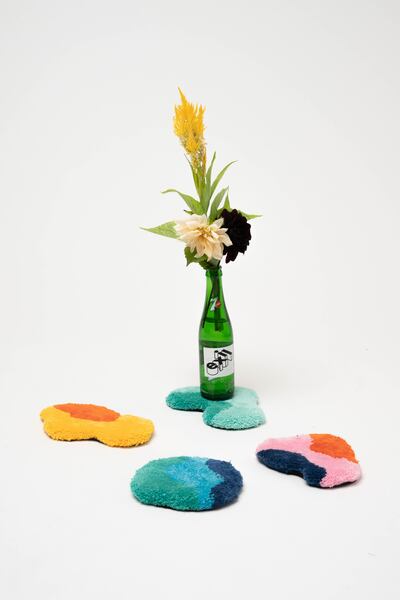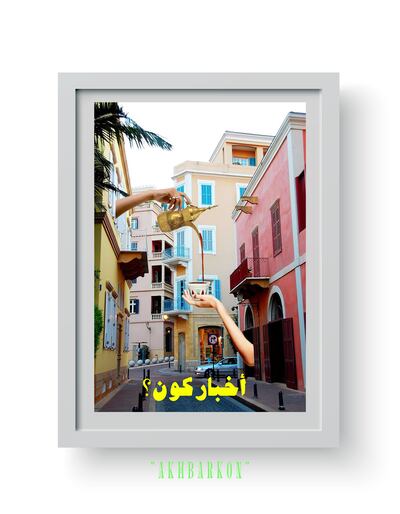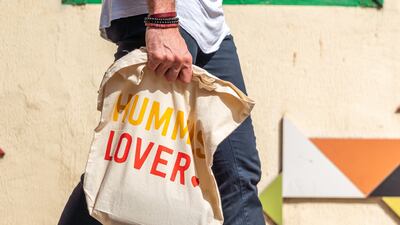From vintage prints to a book exploring Beirut’s traditional homes and a table crafted from a 200-year-old tree, the Beirut Concept Store at Dubai Design Week is showcasing the breadth of Lebanon’s creative offering.
Curated by Mariana Wehbe and conceptualised by artist Rumi Dalle, the initiative aims to shine a spotlight on Lebanon’s design scene, providing visibility as well as commercial opportunities for the multifaceted creatives being featured, at a time when they need it most.

“I am sincerely grateful for the support of Dubai Design Week and the Dubai Design District for providing us with this platform, which offers visitors an experiential journey into the heart of Beirut’s design scene, while promoting the work of emerging and established designers and studios from Lebanon, shedding light on the country’s talent, capabilities and possibilities,” says Wehbe.
Making its debut in the concept store is Exil Collective, a newly launched incubator that is presenting more than 20 established and emerging product designers. Exil has created a framework whereby cost-conscious objects made in Lebanon are industry-competitive, by adapting designs to local manufacturing skills.

Works by master ceramists such as Hala Matta, Nathalie Khayyat, Souraya Haddad and Lina Shamma sit alongside gift items and memorabilia from Beirut Je T’aime, Spockdesign and Cut Paste Build, ensuring there is something for everyone in this intriguing space.
At its centre is a four-metre-long table by architect Samer Bou Rjeily, called Untitled. The piece is crafted from a long metal plank and the trunk of a pine tree that is more than 200 years old, which Bou Rjeily came across in Lebanon after it had been toppled by an unusually powerful storm. “It was about giving another life to something that was already dead,” the designer says.

The trunk was treated with the 18th-century Japanese technique of shou sugi ban, which involves preserving wood using fire. And so it became a reflection on one of nature’s most volatile elements: while fire has destroyed numerous forests in Lebanon in recent years, here it is harnessed to protect and weatherproof the wood and ensure its longevity.
Concrete is the chosen medium for siblings Marylynn and Carlo Massoud, who have been experimenting with the material to create oversized but lightweight indoor and outdoor furniture in various hues. The pieces are made in Lebanon by local artisans and reflect the duo’s innovative, fun-loving take on common objects.

Lebanon’s capital looms large in the work of the selected designers, whether appearing on the pages of The House of Beirut, a book first published in 1997 by Nayla Audi and then reimagined by her daughters in the wake of the explosion that rocked through the city last year; or in the charming prints of Cut Paste Build, which pay tribute to the contradictions inherent in a city that is both beautiful and difficult.
Under the moniker OhMyHappiness, writer Raja Farah documents this dichotomy in 291 Days, a collection of works that chronicle events in Lebanon between the October 17, 2019 revolution and the August 4, 2020 Beirut blast, and the aftermath.
Using micro-stories, short anecdotes and rallying calls, the writer has documented everyday life in Lebanon during an exceptional period “filled with hope and despair, with the backdrop of a global pandemic”, with the aim of challenging the traditional narrative of stories told about the country.
The book is available in the UAE for the first time exclusively at Dubai Design Week, which is running from Monday to Saturday.

Karim Chaya, founder of Spockdesign, pays homage to a very specific section of the city. He creates architectural scale models of one of his favourite structures, the grain silos at Beirut harbour, which he credits with protecting part of the city when they withstood the August 4 blast.
But the sentiments of the participating designers are perhaps best summed up by the simple messages on the tote bags created by Rouba Mourtada, which read: “Beirut Je T’aime” and “I left my heart in Beirut”.


